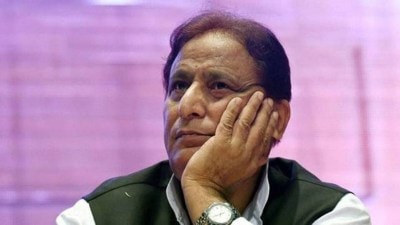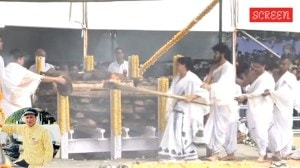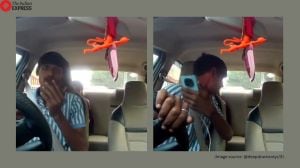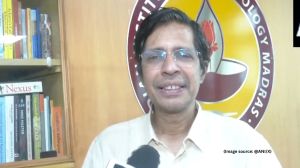Ritu Sarin is Executive Editor (News and Investigations) at The Indian Express group. Her areas of specialisation include internal security, money laundering and corruption. Sarin is one of India’s most renowned reporters and has a career in journalism of over four decades. She is a member of the International Consortium of Investigative Journalists (ICIJ) since 1999 and since early 2023, a member of its Board of Directors. She has also been a founder member of the ICIJ Network Committee (INC). She has, to begin with, alone, and later led teams which have worked on ICIJ’s Offshore Leaks, Swiss Leaks, the Pulitzer Prize winning Panama Papers, Paradise Papers, Implant Files, Fincen Files, Pandora Papers, the Uber Files and Deforestation Inc. She has conducted investigative journalism workshops and addressed investigative journalism conferences with a specialisation on collaborative journalism in several countries. ... Read More
Taj ghost is back: CBI said no case, CVC says Maya directly involved
Lying with the Supreme Court since May last year is a 29-page report that could spark off a political storm and drag former Uttar Pradesh Ch...

Lying with the Supreme Court since May last year is a 29-page report that could spark off a political storm and drag former Uttar Pradesh Chief Minister Mayawati right back into the Rs 175-crore Taj Heritage Corridor controversy.
The corruption case against her was closed by the CBI almost a year ago—on the basis of Attorney General Milon Banerjee’s opinion—but responding to the Supreme Court’s request for its opinion, the Central Vigilance Commission has sent a damning indictment: “her direct involvement in the irregular commencement of work (October 2003) and release of funds.”
The apex court is expected to resume hearings in the case next month.
This indictment is significant since the CBI has asked the Supreme Court to file a closure report in the Taj case.
Taking a stand in sharp contrast to the A-G’s, the CVC’s report, available with The Sunday Express, says that Mayawati’s conduct right through the project “leads to the irresistible inference that under her instructions only the department moved so fast…as otherwise so many officials would not have dared to take such hasty, bold and high-handed action at the risk of losing their jobs and facing prosecution.’’
Recommending prosecution of Mayawati and the officials accused, the CVC report says that Mayawati is “directly involved in the irregular commencement of the work and release of funds to the contractors.” And so she should be booked for being “party to the conspiracy for commission of offences under the Prevention of Corruption Act and the Indian Penal Code.’’
|
In his opinion, used by CBI to close the case, AG Milon Banerjee said the opposite:
|
|||||
|
• Accused P L Punia not reliable because he changed testmony: first, he said that he signed the file without Mayawati’s knowledge and then he said it had her approval Story continues below this ad CVC SAYS |
|||||
Key to the CVC’s case are two statements made by Mayawati’s Principal Secretary, P L Punia, to the CBI in May 2004 and in a sworn affidavit given to the Special Judge in Lucknow in June that year. Punia told the CBI that he had explained to Mayawati in detail that work couldn’t begin without the CCEA approval, project reports and techno-feasibility studies. However, Punia said, she told him that she had raised the matter with the Centre and work could indeed begin pending approval.
Punia testified that ‘‘she (Mayawati) also explained that work could go on like other projects where CCEA approvals were still awaited and construction work had already started.’’
Interrogated by the CBI, Mayawati denied giving approval for the project but the CVC held that Punia’s testimony was ‘‘credible and reliable.’’
Following its own probe and scrutiny of 18 volumes of case material, the CVC has built its case against Mayawati. Salient points:
• Mayawati was aware that work had begun. She was also aware that she needed the approval of the Centre’s Cabinet Committee on Economic Affairs. She herself signed a note to then Environment Minister T R Balu for CCEA approval.
• As UP Environment Minister, Mayawati should have made inquiries about the execution and tendering etc. of a prestigious project of this nature. But this was not done.
• Work started without proper detailed project reports and environmental assessment. It continued till the monitoring Committee brought it to the notice of the Supreme Court which directed stoppage of work.
• The state Government issued an order for release of Rs 17 crore without approval of the Expenditure Finance Committee. Given her position as the head of the government and the Minister concerned, she should have promptly reacted when work began and money was released without her approval. But she took no action to stop the work.
|
TIMELINE
|
||||
|
• October 31, 2002: UP Chief Minister Mayawati gives approval for the Taj Heritage Corridor project |
||||
Photos



- 01
- 02
- 03
- 04
- 05





























